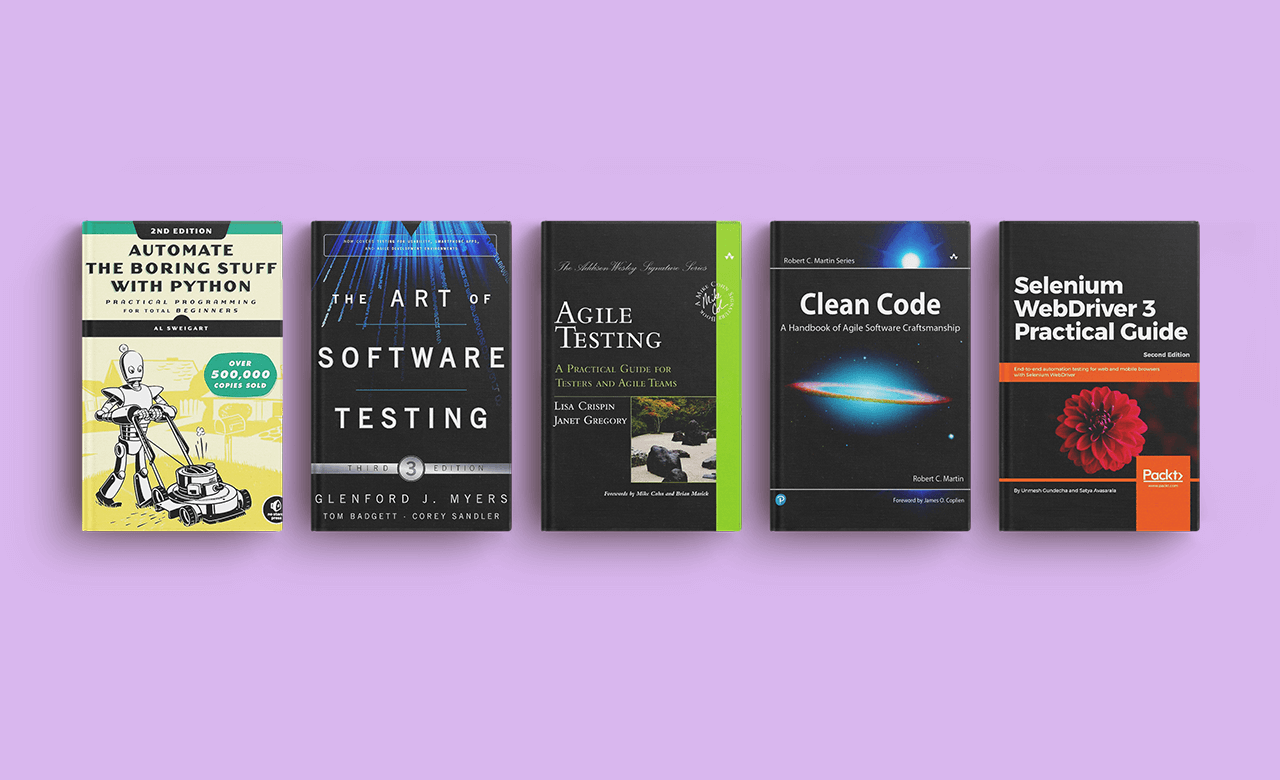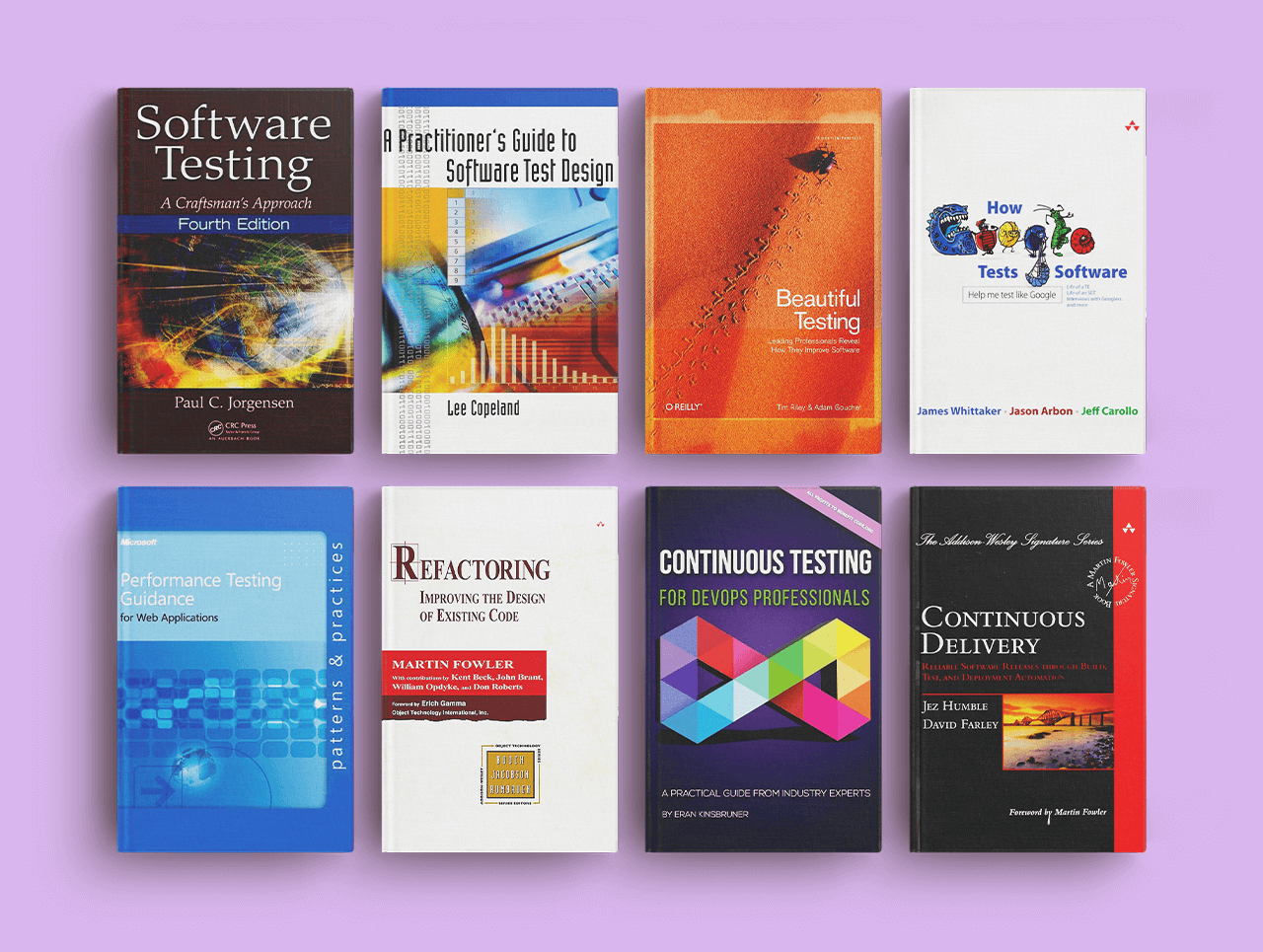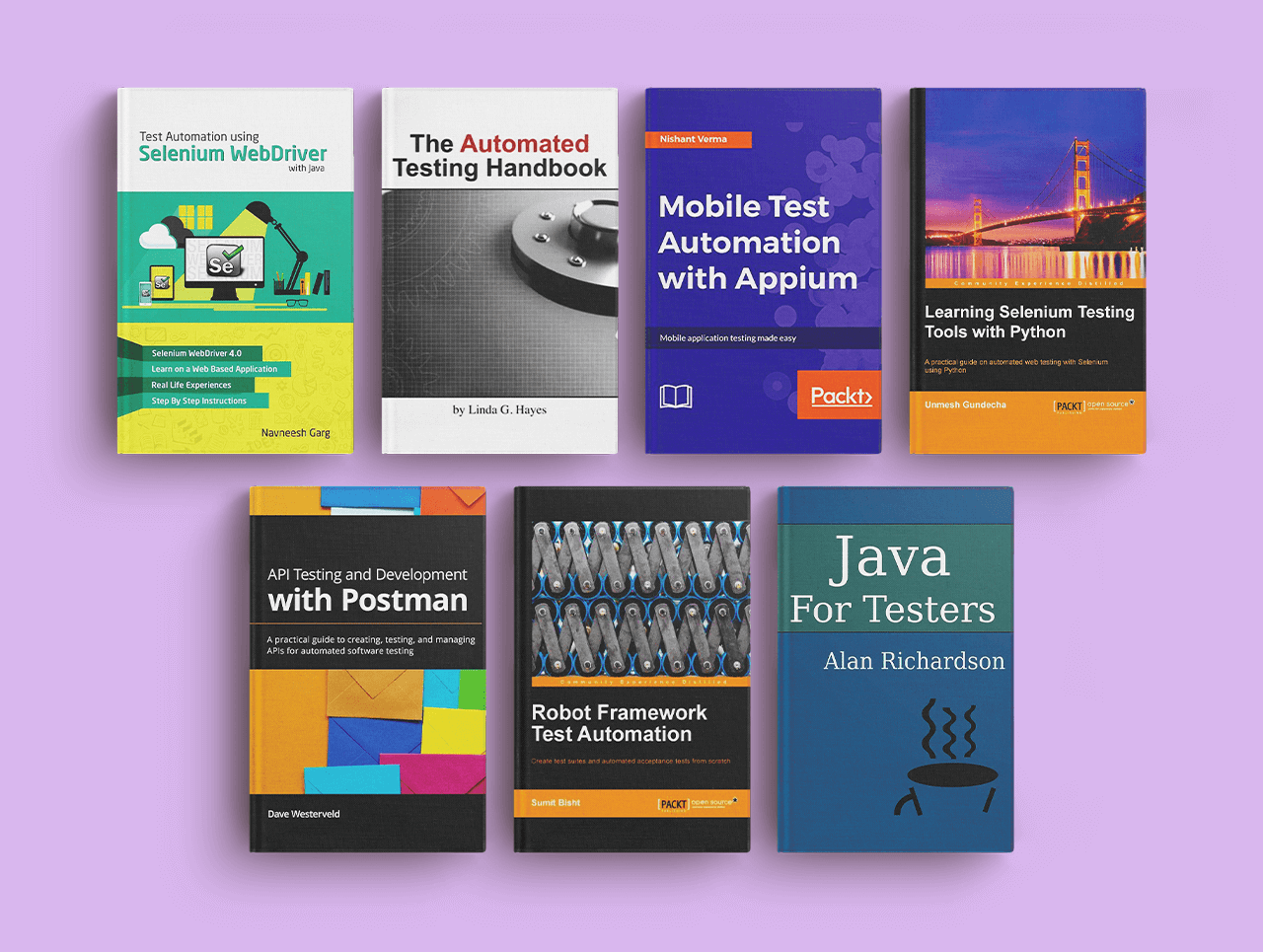Best Test Automation Books List

Embarking on the journey to become an automation tester requires a well-defined path of learning and skill acquisition. For those wondering, “What should a QA automation engineer learn?” the answer lies in a robust understanding of both the theoretical and practical aspects of quality assurance and automation testing. This knowledge foundation is essential for navigating the complexities of modern software development and ensuring the delivery of high-quality software products. The transition from theory to practice is where the challenge often lies, but with the right automation testing books, aspiring automation testers can bridge this gap efficiently.
Among these invaluable resources are books that provide in-depth insights into the principles, tools, and practices of automation testing. The best test automation books serve not only as introductory guides for beginners but also as comprehensive references for experienced professionals looking to expand their expertise. These books for automation testing cover a wide range of topics, from basic concepts to advanced techniques and QA skills, offering readers a well-rounded perspective on how to become an automation tester. Whether you are just starting out in your career or seeking to enhance your strategies, this carefully curated list of books will be your companion through the intricate landscape of test automation.
Best Test Automation Books Shortlist
1. Automate the Boring Stuff with Python by Al Sweigart
2. The Art of Software Testing by Glenford J. Myers, Corey Sandler, and Tom Badgett
3. Agile Testing: A Practical Guide for Testers and Agile Teams by Lisa Crispin and Janet Gregory
4. Clean Code: A Handbook of Agile Software Craftsmanship by Robert C. Martin
5. Software Testing: A Craftsman's Approach by Paul C. Jorgensen
6. A Practitioner's Guide to Software Test Design by Lee Copeland
7. Beautiful Testing: Leading Professionals Reveal How They Improve Software by Tim Riley and Adam Goucher
8. How Google Tests Software by James A. Whittaker, Jason Arbon, and Jeff Carollo
9. Performance Testing Guidance for Web Applications: Patterns and Practices by Et Al. Meir
10. Refactoring: Improving the Design of Existing Code by Martin Fowler and Kent Beck
Automation Testing Books for Beginners
Diving into the world of automation testing can seem daunting at first, especially for those wondering how to become an automation tester. Fortunately, there are numerous automation testing books designed specifically for beginners. By starting with the best ones, aspiring testers can find clarity and direction in the complex landscape of IT professions, making the initial steps of their career journey both informative and engaging.
While reading books about automation testing for beginners is an excellent choice, there’s more you can do to get your career moving in the right direction. The Career Bootcamp from Anywhere Club is an online educational program designed to give professionals an advantage during their job search. From interview coaching to job search hacks – all with help from an experienced recruiter – this bootcamp makes it easy to get your career off the ground.
Beyond formal education and bootcamps, the act of reading itself plays a critical role in the continuous learning and development of a QA automation engineer. The books for studying IT professions not only impart technical knowledge but also inspire innovative thinking and problem-solving skills. Here’s a look at some excellent options for those starting out in the field.

1. Automate the Boring Stuff with Python by Al Sweigart
This one of the top selling QA automation books, and it’s revered for its approachable and practical guide to Python programming, focusing on automating mundane tasks. Sweigart excels in making programming accessible, offering readers the tools to start creating their own automation scripts. The real-world examples provided are not only engaging but also immensely applicable to the day-to-day tasks that testers and non-programmers face, making automation seem within reach for anyone willing to learn.
2. The Art of Software Testing by Glenford J. Myers, Corey Sandler, and Tom Badgett
This classic in the realm of automated software testing books provides an extensive overview of key principles and methodologies. Myers, Sandler, and Badgett delve into the core of what makes effective strategies, including the role of automation in achieving quality software. The book's enduring relevance and comprehensive approach make it a foundational piece in any tester's library. It's not just an automated testing book; it's a guide to the entire landscape, making it a worthwhile read for those looking to grasp the full spectrum of software testing.
3. Agile Testing: A Practical Guide for Testers and Agile Teams by Lisa Crispin and Janet Gregory
Crispin and Gregory's book explores the integral role of testing in agile development, emphasizing the value of automated testing in agile environments. The authors provide a thorough examination of how testing fits within agile methodologies and offer strategies for integrating automated testing practices into agile workflows. This book is a treasure trove of insights for testers adapting to agile settings, covering a wide range of topics from crafting strategies to understanding the significance of automation in agile projects.
4. Clean Code: A Handbook of Agile Software Craftsmanship by Robert C. Martin
Martin's book stands as a seminal work in the domain of software development, particularly revered among resources for improving coding practices. Martin, with his profound experience and insight, delves into the essence of writing clean, maintainable code, making a compelling case for the impact of code quality on software functionality and team productivity. The book is structured to guide readers through principles, patterns, and practices of writing clean code, supplemented by a plethora of examples that illustrate both poor and good practices in a way that's accessible to developers at all levels.
5. Selenium WebDriver Practical Guide by Satya Avasarala
Positioned as a contender for the best book for automation testing, this guide focuses on Selenium WebDriver, a fundamental tool in web automation testing. Avasarala presents a comprehensive and beginner-friendly approach detailing how to effectively automate web application tests using Selenium. The book stands out for its clear explanations and practical examples, making it an invaluable addition to the educational landscape.
Top 15 Books for Automation Testing
Navigating the vast landscape of automation testing can be a daunting task, especially for those looking to refine their techniques and expand their knowledge. The best automation testing books serve as beacons of knowledge, guiding both novices and seasoned professionals through this intricate world.
Diving into the fantastic books below is akin to embarking on an intellectual adventure, where every chapter unveils new methods, insights, and perspectives on how to efficiently automate and optimize various processes. If you’re looking for some of the top books focused on the field, here are some options to explore.

1. Software Testing: A Craftsman's Approach by Paul C. Jorgensen
Jorgensen's book is widely regarded as one of the best books for automation testing, providing a comprehensive look into the art and science of software testing. It covers the fundamental principles and methodologies of both manual and automated approaches, emphasizing a craftsman's approach to quality assurance. Through detailed explanations and practical examples, Jorgensen guides readers through the various stages and techniques, offering insights into creating effective test cases and strategies. This book is essential for understanding the intricacies of testing and how it fits into the software development lifecycle.
Jorgensen's emphasis on the craftsmanship of testing makes this book stand out. It's not just about following steps but about understanding the why and how behind each activity. The blend of theory and practical application, coupled with the author's expertise, provides readers with a deep understanding of software testing's complexities. This book is invaluable for anyone looking to improve their testing skills and ensure the delivery of high-quality software.
2. A Practitioner's Guide to Software Test Design by Lee Copeland
Copeland's work is a testament to the design aspect of testing, making it a critical test automation principles book. It offers an in-depth exploration of various test design techniques, from traditional methods like boundary value analysis to more contemporary approaches like combinatorial testing. Copeland's clear and concise explanations make complex concepts accessible, and his focus on practical application helps readers implement these techniques in their practices. This book is a must-read for those looking to enhance their test design skills and build more effective and efficient test cases.
The strength of Copeland's book lies in its focus on the design aspects of testing, an area often overlooked in other texts. By providing a wide range of test design techniques and the context for their use, Copeland equips readers with the tools needed to tackle various testing challenges. This book is particularly beneficial for testers seeking to elevate the quality and effectiveness of their test cases, making it a valuable addition to any QA professional's library.
3. Beautiful Testing: Leading Professionals Reveal How They Improve Software by Tim Riley and Adam Goucher
This compilation, considered one of the automation testing tools books, brings together insights from leading professionals in the field, offering a multifaceted view of software testing. Through a series of essays, contributors share their experiences, techniques, and philosophies on improving software quality through testing. Covering a wide range of topics from automation to test-driven development, the book provides a diverse perspective on what makes testing beautiful. It's an inspirational read that encourages testers to think creatively about their role and the impact they can have on software quality.
"Beautiful Testing" is unique in its approach to exploring the artistry and impact of testing. The personal stories and varied viewpoints provide readers with a rich tapestry of ideas and practices that can inspire innovation in their testing work. This book is especially worthwhile for those looking to gain insights from the experiences of seasoned professionals and to understand the broader significance of testing in software development.
4. How Google Tests Software by James A. Whittaker, Jason Arbon, and Jeff Carollo
Offering an inside look at one of the tech industry's giants, "How Google Tests Software" is often cited as the best book on test automation for those interested in large-scale, cutting-edge testing practices. The authors detail Google's innovative approaches to testing, from the organizational structure to the tools and techniques that enable rapid development and high-quality outcomes. This book is not just about Google's success stories; it's a practical guide on how the principles and practices implemented at Google can be adapted to other environments.
The real-world insights into Google's testing practices provide a valuable learning opportunity for readers. Understanding how a leading tech company approaches testing challenges and innovates in the space can offer new perspectives and ideas for improving testing practices in any organization. This book is particularly beneficial for those looking to scale their testing efforts and implement effective test automation strategies.
5. Performance Testing Guidance for Web Applications: Patterns and Practices by Et Al. Meir
This comprehensive guide delves into the specifics of performance testing for web applications, making it a crucial resource among automation testing tools books. The authors cover everything from planning and designing performance tests to analyzing and interpreting results. With a focus on patterns and practices, the book provides a structured approach to identifying performance bottlenecks and optimizing web application performance. It's an invaluable resource for testers and developers alike, offering practical advice and strategies for ensuring web applications meet performance expectations.
The detailed guidance on performance testing, combined with the focus on patterns and best practices, makes this book an essential read for anyone involved in web application development and testing. The step-by-step approach to planning, executing, and analyzing performance tests can help readers identify and address performance issues more effectively, improving the overall user experience of web applications.
6. Refactoring: Improving the Design of Existing Code by Martin Fowler and Kent Beck
Martin Fowler and Kent Beck's "Refactoring" is a cornerstone test automation best practices book that transcends the boundary between development and testing. It addresses the crucial task of improving the design of existing code without altering its functionality. Through detailed examples and a catalog of refactoring techniques, the authors demonstrate how systematic changes can enhance code readability, maintainability, and performance. This book is essential for developers and testers alike, as it provides a common language and methodology for improving code quality.
As one of the best books to learn automation testing, "Refactoring" is revered for its practical approach to code improvement, making it an indispensable resource for those involved in software development and testing. The emphasis on small, controlled changes to code to improve its structure and readability without changing its behavior is a powerful concept that can lead to more reliable and maintainable code bases. This book not only teaches how to refactor code but also instills a mindset of continuous improvement, making it a must-read for professionals committed to crafting high-quality software.
7. Continuous Testing for DevOps Professionals by Eran Kinsbruner
In this book, Kinsbruner addresses the integration of automated testing within the DevOps cycle, highlighting continuous testing as a crucial component of successful DevOps practices. The book offers clear insights into how testing, especially automated approaches, can be seamlessly woven into development and deployment processes, thus improving the speed and quality of software delivery.
For testers keen on aligning their practices with modern DevOps methodologies, this book is an indispensable guide. It not only provides the theoretical background necessary for understanding continuous testing but also offers practical advice and examples for implementing these strategies, making it a key resource among automated testing books.
8. Continuous Delivery: Reliable Software Releases Through Build, Test, and Deployment Automation by Jez Humble
Humble's test automation book explores the relationship between continuous delivery and test automation, highlighting how automated testing is essential for achieving fast and reliable software releases. The book covers the principles of continuous delivery and provides detailed guidance on how to integrate automated testing into the continuous delivery pipeline. Humble's expertise in both continuous delivery and test automation makes this book a must-read for teams looking to streamline their software delivery processes.
The value of this book lies in its comprehensive coverage of both topics and the practical advice it offers for integrating test automation into continuous delivery workflows. It's an essential resource for teams aiming to improve their software delivery speed and quality through automation.

9. Test Automation using Selenium WebDriver with Java by Navneesh Garg
As a pivotal test automation book, Garg's work dives deep into the integration of Selenium WebDriver with Java, offering a structured pathway for beginners to build their automation testing skills. The book is rich in practical examples and exercises designed to enhance the reader's understanding of automation concepts and tools, making it an essential resource for anyone starting in the field.
The value of this book lies in its comprehensive coverage of Selenium and Java, providing readers with the knowledge to create effective automation strategies. It's a critical read for aspiring automation testers seeking to understand the nuances of automated testing and improve their skills in one of the most in-demand areas of software development.
10. The Automated Testing Handbook by Linda Hayes
Hayes' book is a classic software test automation book, providing a comprehensive overview of fautomated testing principles and practices. The book covers a wide range of topics, from the basics to advanced strategies for designing and maintaining effective test suites. Hayes' practical advice and real-world examples make this book an essential resource for anyone looking to master automated testing.
What makes "The Automated Testing Handbook" stand out is its timeless relevance. Despite the rapid evolution of testing tools and technologies, the principles and practices discussed in this book remain applicable, making it a valuable resource for testers of all experience levels.
11. Mobile Test Automation with Appium by Nishant Verma
Verma's creation is one of the good books on automation testing because it focuses on mobile test automation using Appium, one of the leading tools for automating mobile application tests. The book provides a comprehensive guide to setting up and using Appium to test Android and iOS applications. Verma's step-by-step instructions and practical examples make it easy for readers to get started with mobile test automation, making this book an essential resource for anyone working with mobile applications.
The strength of "Mobile Test Automation with Appium" lies in its detailed coverage of Appium and its applications in mobile testing. It's a must-read for mobile testers looking to automate their processes and improve the quality and reliability of their mobile applications.
12. Learning Selenium Testing Tools with Python by Unmesh Gundecha
Gundecha's book is a standout among QA automation books, focusing specifically on using Selenium with Python for web testing. It breaks down complex concepts into digestible segments, supplemented by practical examples that guide beginners through the nuances of both Selenium and Python. This approach makes the book particularly beneficial for those new to automation testing, providing a clear path to mastering web automation tasks.
The book's emphasis on Python, a language known for its simplicity and readability, makes it an ideal choice for testers looking to start their journey in automation. It's a comprehensive guide that equips readers with the necessary skills to automate web testing effectively, making it a valuable addition to the list of essential resources for QA pros of all experience levels.
13. API Testing and Development with Postman by Dave Westerveld
Westerveld's book explores API testing and development using Postman, a popular tool for testing and interacting with APIs. The book provides a detailed guide to using Postman for designing, testing, and documenting APIs. Westerveld's practical approach and step-by-step instructions make it easy for readers to master API testing with Postman, making this book a valuable resource for anyone working with APIs.
The value of "API Testing and Development with Postman" among other books about automation testing lies in its detailed coverage of Postman and its applications in API testing. It's an essential read for developers and testers looking to improve their practices and ensure their APIs are reliable and well-documented.
14. Robot Framework Test Automation by Sumit Bisht
Focusing on the Robot Framework, Bisht's book is a practical guide to automating acceptance testing. It delves into the framework's features, teaching readers how to utilize them to create effective automated tests. This book is particularly suited for beginners interested in exploring the Robot Framework and its applications in acceptance testing.
What sets this book apart is its emphasis on practical examples and a step-by-step approach, making it an accessible and valuable resource for those new to the Robot Framework. It's a key addition to the arsenal of software test automation books, offering a unique perspective on acceptance testing automation.
15. Java for Testers by Alan Richardson
Specifically tailored for testers, Richardson's book demystifies Java, concentrating on its application in test automation. It provides a clear introduction to Java fundamentals, avoiding unnecessary complexities and focusing on what testers need to know to write automated tests effectively. This approach makes it the ideal starting point for testers looking to incorporate Java into their automation toolkit.
The book's practical nature and focus on automation make it a standout among automated testing books. It's an essential read for testers looking to expand their skills in Java for automation purposes, offering a straightforward path to mastering the language in a testing context.
Improve Your Knowledge and Skills with QA Courses from Anywhere Club
If you’re ready to go beyond automation testing books and embark on a transformative journey, enhance your software development acumen with the Anywhere Club Courses Catalog. If you’re looking for a comprehensive course for software testing, meticulously designed to cover all things essential for budding and seasoned QA professionals alike, the Club’s free and LinkedIn courses fit the bill. From the fundamentals to the latest techniques and tools, the Club’s classes are structured to provide you with a deep understanding of the field, ensuring you reap the benefits of well-rounded knowledge and practical skills.

.png)
